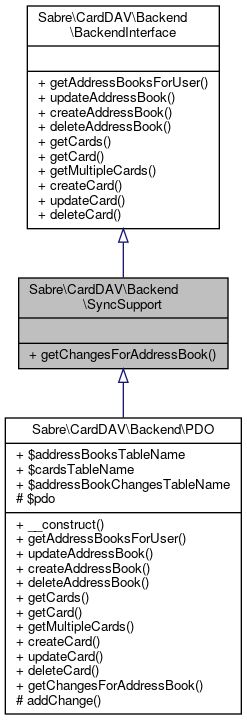WebDAV-sync support for CardDAV backends. More...
 Inheritance diagram for Sabre\CardDAV\Backend\SyncSupport:
Inheritance diagram for Sabre\CardDAV\Backend\SyncSupport: Collaboration diagram for Sabre\CardDAV\Backend\SyncSupport:
Collaboration diagram for Sabre\CardDAV\Backend\SyncSupport:Public Member Functions | |
| getChangesForAddressBook ($addressBookId, $syncToken, $syncLevel, $limit=null) | |
| The getChanges method returns all the changes that have happened, since the specified syncToken in the specified address book. More... | |
 Public Member Functions inherited from Sabre\CardDAV\Backend\BackendInterface Public Member Functions inherited from Sabre\CardDAV\Backend\BackendInterface | |
| getAddressBooksForUser ($principalUri) | |
| Returns the list of addressbooks for a specific user. More... | |
| updateAddressBook ($addressBookId, \Sabre\DAV\PropPatch $propPatch) | |
| Updates properties for an address book. More... | |
| createAddressBook ($principalUri, $url, array $properties) | |
| Creates a new address book. More... | |
| deleteAddressBook ($addressBookId) | |
| Deletes an entire addressbook and all its contents. More... | |
| getCards ($addressbookId) | |
| Returns all cards for a specific addressbook id. More... | |
| getCard ($addressBookId, $cardUri) | |
| Returns a specfic card. More... | |
| getMultipleCards ($addressBookId, array $uris) | |
| Returns a list of cards. More... | |
| createCard ($addressBookId, $cardUri, $cardData) | |
| Creates a new card. More... | |
| updateCard ($addressBookId, $cardUri, $cardData) | |
| Updates a card. More... | |
| deleteCard ($addressBookId, $cardUri) | |
| Deletes a card. More... | |
Detailed Description
WebDAV-sync support for CardDAV backends.
In order for backends to advertise support for WebDAV-sync, this interface must be implemented.
Implementing this can result in a significant reduction of bandwidth and CPU time.
For this to work, you must return a {http://sabredav.org/ns}sync-token property from getAddressBooksForUser.
- Copyright
- Copyright (C) fruux GmbH (https://fruux.com/)
Definition at line 21 of file SyncSupport.php.
Member Function Documentation
◆ getChangesForAddressBook()
| Sabre\CardDAV\Backend\SyncSupport::getChangesForAddressBook | ( | $addressBookId, | |
| $syncToken, | |||
| $syncLevel, | |||
$limit = null |
|||
| ) |
The getChanges method returns all the changes that have happened, since the specified syncToken in the specified address book.
This function should return an array, such as the following:
[ 'syncToken' => 'The current synctoken', 'added' => [ 'new.txt', ], 'modified' => [ 'modified.txt', ], 'deleted' => [ 'foo.php.bak', 'old.txt' ] ];
The returned syncToken property should reflect the current syncToken of the calendar, as reported in the {http://sabredav.org/ns}sync-token property. This is needed here too, to ensure the operation is atomic.
If the $syncToken argument is specified as null, this is an initial sync, and all members should be reported.
The modified property is an array of nodenames that have changed since the last token.
The deleted property is an array with nodenames, that have been deleted from collection.
The $syncLevel argument is basically the 'depth' of the report. If it's 1, you only have to report changes that happened only directly in immediate descendants. If it's 2, it should also include changes from the nodes below the child collections. (grandchildren)
The $limit argument allows a client to specify how many results should be returned at most. If the limit is not specified, it should be treated as infinite.
If the limit (infinite or not) is higher than you're willing to return, you should throw a Sabre\DAV\Exception\TooMuchMatches() exception.
If the syncToken is expired (due to data cleanup) or unknown, you must return null.
The limit is 'suggestive'. You are free to ignore it.
- Parameters
-
string $addressBookId string $syncToken int $syncLevel int $limit
- Returns
- array
Implemented in Sabre\CardDAV\Backend\PDO.
The documentation for this interface was generated from the following file:
- libs/composer/vendor/sabre/dav/lib/CardDAV/Backend/SyncSupport.php


